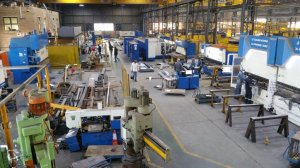The lack of good-quality artisanal skills in South Africa, specifically welding skills, calls for a bigger focus on the development of training schools, says specialised stainless steel products supplier Plasma Cut technical director Manny da Silva.
The company has been involved in State-owned freight utility Transnet’s 1064 Locomotive Build, a R50-billion contract for the building of 1 064 locomotives that was awarded in 2014 to locomotives developer and manufacturer China South Rail (CSR); planes and trains manufacturer Bombardier Transportation South Africa; infrastructure technologies, services and solutions provider General Electric South Africa Technologies; and locomotives and rolling stock manufacturer China North Rail (CNR).
Da Silva explains that Plasma Cut has been subcontracted to supply CSR with parts in the form of weld preps, but not to do the actual welding for the project. He highlights that CSR prefers to do its own in-house welding rather than subcontract South African companies.
He highlights that a lack of skills in the country is a widespread problem that needs to be addressed and points out that a bigger focus on the development of training schools and implementing stricter standards at such institutions is imperative to improve the international recognition of local welders’ skills.
He also notes that learning to weld requires talent and hard work: “Welding is a skill that takes time and commitment to learn . . . Too often people seem to be concerned only with completing their training and getting a certificate, and this is a mindset that needs to change,” he maintains.
Apart from
addressing skills shortages, Plasma Cut MD Kanyisa Limekaya recommends that businesses need to adapt to the challenging economic environment by focusing on industry collaboration and the provision of holistic solutions to remain viable.
He notes that the steel processing industry has been affected by the global commodities downturn, which has forced companies in many industries that would usually require metal processing for projects, to downsize their operations or shift into maintenance mode.
“It’s an industry under stress,” says Da Silva, adding that this has resulted in clients increasingly seeking to delegate projects to companies that can manage the work in their entirety – by subcontracting to third parties where necessary – on the client’s behalf.
He cites Plasma Cut’s contract with Transnet to manufacture bunker beds for State-owned railway utility Botswana Railways as an example. The contract entailed the bending of sheet metal for the frames of the bunkers, which Plasma Cut has the technical expertise to do, but also the manufacture of iron-cast elements to secure the bunkers to the coach walls, which are not in Plasma Cut’s scope of business. Plasma Cut, however, took on the project and sourced the components it could not produce on the client’s behalf.
“In the current market, our company aims to be a solutions-driven company. Plasma Cut has established relationships with many businesses in the industry, and we can offer a better service to our clients by drawing on these relationships to manage projects on their behalf and provide holistic solutions,” says Limekaya.
To further enhance its product offering, Plasma Cut developed tooling for specific use in the cutting of products for Transnet. Da Silva explains that the clients required pieces to be cut according to very specific, unusual and varying measurements that standard cutting tools were unable to handle. Standard tools can only cut to measurements in multiples of 5 mm, and the company thus developed a dynamic cutting tool, the first of its kind on the market, that could cut to more varying measurements.
Edited by: Zandile Mavuso
Creamer Media Senior Deputy Editor: Features
EMAIL THIS ARTICLE SAVE THIS ARTICLE
To subscribe email subscriptions@creamermedia.co.za or click here
To advertise email advertising@creamermedia.co.za or click here












